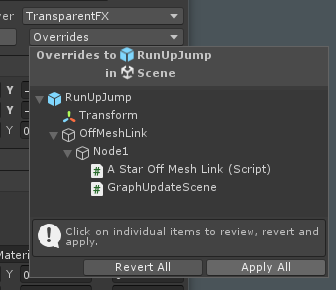Unity prefabs are awesome. They are easy to create, easy to instantiate, and with the current versions of the Unity Editor can be used to create prefab variants and even nest prefabs within prefabs, allowing you to modularize the design of systems and scene objects.
But this simplicity comes at the cost of a higher risk of screwing things up the larger your project or the team grow...
All because of this little "Apply All" Inspector button, which is both a blessing and a curse:

You know what I'm talking about. Imagine having a prefab for an object or an important interactive actor, and scattering it all over the scenes in the project, each one — with its own unique overrides for the position, variable values or even MonoBehavior component scripts attached or removed. Obviously, they are all based on the same shared prefab asset on disk, which is expected to have a certain set of initial values and components, which are then either used "as is" or are changed slightly here and there in the scenes.
The problem is, it only takes one careless press of the "Apply All" button to screw up the prefab for every single instance of that prefab in all the scenes! And chances are, you or a member of your team will eventually press this button and completely change the base prefab on disk, which all scene instances are based upon. And the more prefabs in your project, or members in your team, the higher the chance of this event happening. Sometimes stealthily, which is even worse... Thank Heavens for version control!
Unfortunately, Unity doesn't provide a way to disable this button for certain prefabs (at least I wasn't able to find a way to do so). That's why when designing my previous game, even though I was the only developer and scene builder, I decided to save myself the headache and created a custom bare-bones "ActorLoader" prefab. I would then exclusively use this prefab to place interactive instantiatiables in the scenes. Such a prefab had just a handful of fields which were meant to always be overriden and not to use base properties stored in the shared prefab: a prefab type enum (used to determine which prefab to instantiate from the Resources folder), starting Transform parameters and a couple of modifiers, all overridden right away to ensure that no changes to the base prefab asset would ever break ActorLoaders anywhere in the project. And this approach worked wonderfully.
Such "loaders" are in fact considered standard practice in the industry in contrast to scattering actual prefabs in the scenes, for a lot of reasons, which I won't list here. But this still doesn't solve the original problem of prefabs being modifiable with a press of a button!
A Solution!
Unity prefab is just a serialized object. Which means we can tap into the serialization routine and do something when Unity serializes or deserializes a prefab in the Editor. All you need to do is extend one or several MonoBehavior components attached to the prefab from the ISerializationCallbackReceiver interface, and implement a couple of methods.
Here's how I did it in my current project: inherited a component from MonoBehavior and the interface:
// See: https://docs.unity3d.com/ScriptReference/ISerializationCallbackReceiver.html
public class MyClass : MonoBehaviour, ISerializationCallbackReceiverAnd then implemented a custom OnBeforeSerialize() routine, which is executed right before Unity commits any changes to the serialized object, which is a prefab in our case. I've commented it to help you understand how it works. Nothing special, but gets the job done:
#region ISerializationCallbackReceiver
void ISerializationCallbackReceiver.OnBeforeSerialize()
{
// This can only be done inside UNITY_EDITOR since we can not check prefab status in a build!
#if UNITY_EDITOR
// IMPORTANT: EditorApplication checks must be done first.
// Otherise Unity may report errors like "Objects are trying to be loaded during a domain backup"
if (EditorApplication.isPlayingOrWillChangePlaymode || EditorApplication.isUpdating) return;
// Validate the type of your prefab. Useful pre-check.
if (UnityEditor.PrefabUtility.GetPrefabAssetType(this) != UnityEditor.PrefabAssetType.Regular) return;
// Override properties only if this is a prefab asset on disk and not any of its scene instances
if (UnityEditor.PrefabUtility.GetPrefabInstanceHandle(this)) return;
// Finally, re-set any fields to initial or specific values for the shared asset prefab on disk
// This protects these fields when "Apply Override" gets called from any of prefab's scene instances
// Example: enforce default position, rotation and scale values for the prefab
transform.localPosition = Vector3.zero;
transform.localRotation = Quaternion.identity;
transform.localScale = Vector3.one;
// Example: your variables here
// myFloat = 1f;
// myAssetRef = null;
// myClassInstance.myString = "Default string";
#endif
}
// OnAfterDeserialize can be left empty
void ISerializationCallbackReceiver.OnAfterDeserialize() { }
#endregionAs you can see, this method makes sure that each serialization call to the shared prefab asset on disk goes through a custom procedure which re-sets values for certain fields and references, and can even check whether specific components are attached to the prefab root or any of its children, and either add them if they're missing, or remove ones that shouldn't be there. This procedure is invoked any time prefab is serialized, which includes the aforementioned "Apply All" button or any other way to apply changes to the original asset.
And there you have it! With this approach each time you create a new prefab you can decide which shared asset fields and references should be protected from accidental overrides, and simply specify default/initial values for them within the ISerializationCallbackReceiver's OnBeforeSerialize() method.